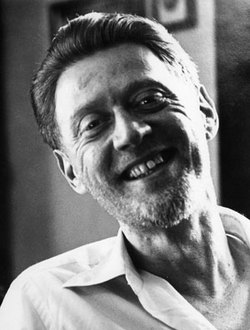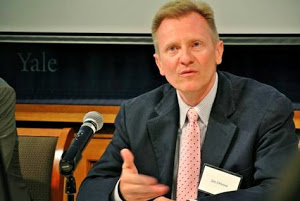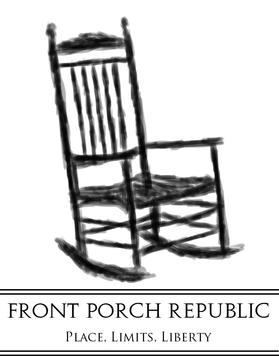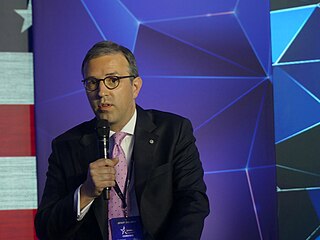
Alexis Charles Henri Clérel, comte de Tocqueville, usually known as just Tocqueville, was a French aristocrat, diplomat, political scientist, political philosopher and historian. He is best known for his works Democracy in America and The Old Regime and the Revolution (1856). In both, he analyzed the living standards and social conditions of individuals as well as their relationship to the market and state in Western societies. Democracy in America was published after Tocqueville's travels in the United States and is today considered an early work of sociology and political science.
Liberal conservatism is a political ideology combining conservative policies with liberal stances, especially on economic issues but also on social and ethical matters, representing a brand of political conservatism strongly influenced by liberalism.
Wilson Carey McWilliams, son of Carey McWilliams, was a political scientist at Rutgers University.
In the United States, conservatism is based on a belief in limited government, individualism, traditionalism, republicanism, and limited federal governmental power in relation to U.S. states. Conservative and Christian media organizations, along with American conservative figures, are influential, and American conservatism is one of the majority political ideologies within the Republican Party.
Conservative liberalism, also referred to as right-liberalism, is a variant of liberalism, combining liberal values and policies with conservative stances, or simply representing the right-wing of the liberal movement. In the case of modern conservative liberalism, scholars sometimes see it as a more positive and less radical variant of classical liberalism; it is also referred to as an individual tradition that distinguishes it from classical liberalism and social liberalism. Conservative liberal parties tend to combine economically liberal policies with more traditional stances and personal beliefs on social and ethical issues. Ordoliberalism is a influential component of conservative-liberal thought, particularly in its German, British, French, Italian, and American manifestations.

Peter Robert Edwin Viereck was an American writer, poet and professor of history at Mount Holyoke College. He won the Pulitzer Prize for Poetry in 1949 for the collection Terror and Decorum. In 1955 he was a Fulbright Scholar at the University of Florence.
Bruce P. Frohnen is a Professor of Law at Ohio Northern University College of Law, where he teaches courses in Public and Constitutional Law, Jurisprudence, and Legal Profession.

James R. Otteson is an American philosopher and political economist. He is the John T. Ryan Jr. Professor of Business Ethics at the University of Notre Dame. Formerly, he was the Thomas W. Smith Presidential Chair in Business Ethics, Professor of Economics, and executive director of the Eudaimonia Institute at Wake Forest University. He is also a Senior Scholar at The Fund for American Studies in Washington, D.C., a Research Professor in the Center for the Philosophy of Freedom and in the Philosophy Department at the University of Arizona, a Visitor of Ralston College, a Research Fellow for the Independent Institute in California, a director of Ethics and Economics Education of New England, and a Senior Scholar at the Fraser Institute. He has taught previously at Yeshiva University, New York University, Georgetown University, and the University of Alabama.
Robert Alexander Nisbet was an American conservative sociologist, a professor at the University of California, Berkeley, Vice-Chancellor at the University of California, Riverside, and an Albert Schweitzer Professor at Columbia University.
In American politics, fusionism is the philosophical and political combination or "fusion" of traditionalist and social conservatism with political and economic right-libertarianism. Fusionism combines "free markets, social conservatism, and a hawkish foreign policy". The philosophy is most closely associated with Frank Meyer.
Traditionalist conservatism, often known as classical conservatism, is a political and social philosophy that emphasizes the importance of transcendent moral principles, manifested through certain posited natural laws to which it is claimed society should adhere. Traditionalist conservatism, as we know it today, is primarily based on Edmund Burke's political views, although Toryism represented an even earlier, more primitive form of traditionalist conservatism. Traditionalists value social ties and the preservation of ancestral institutions above what they perceive as excessive individualism.
Ruth Abbey is an Australian political theorist with interests in contemporary political theory, history of political thought and feminist political thought. She was a John Cardinal O'Hara, C.S.C. Associate Professor in the Department of Political Science of the University of Notre Dame.
Progressivism holds that it is possible to improve human societies through political reform. As a political movement, progressivism seeks to advance the human condition through social reform based on purported advancements in science, technology, economic development, and social organization. Adherents hold that progressivism has universal application and endeavor to spread this idea to human societies everywhere. Progressivism arose during the Age of Enlightenment out of the belief that civility in Europe was improving due to the application of new empirical knowledge to the governance of society.

Front Porch Republic is a localist and communitarian American blog where various contributors – known as 'porchers' – emphasize the importance of concepts such as community, place, decentralism, and conservation. Front Porch Republic publishes books under the name Front Porch Republic Books, an imprint of Wipf and Stock. It also sponsors an annual conference and, beginning in 2019, publishes the journal Local Culture.
Stephen Frederick Schneck is an American Catholic activist. Formerly an associate professor at The Catholic University of America (CUA), where he was also the Director of CUA's Institute for Policy Research and Catholic Studies, he retired from the university in 2018. A public speaker and lecturer, Schneck is a frequent source of media analysis on issues involving Catholicism and public policy. He was chair of the Department of Politics from 1995 to 2007 and Acting Undergraduate Dean of the School of Arts & Sciences in 1988. From 2012 to 2013, he was appointed as the Acting Dean of the National Catholic School of Social Service at Catholic University.
Vincent Phillip Muñoz is an American political scientist. He is the Tocqueville Professor in the Department of Political Science and Concurrent Professor of Law at the University of Notre Dame. He is the author of two books on the principles of the American Founding focusing on religious liberty and the separation of church and state in the United States.
Michael P. Zuckert is an American political philosopher and Reeves Dreux Professor of Political Science at the University of Notre Dame. Zuckert earned a bachelor's degree in Cornell University in 1964, and completed his master's degree and doctorate at the University of Chicago in 1967 and 1974, respectively.

Why Liberalism Failed is a 2018 book by Patrick Deneen, a professor of political science at the University of Notre Dame. It criticizes both forms of American liberalism – "classical liberalism," typically called in America "libertarianism"; and "progressive/modern liberalism," often simply called "liberal."
Annelien De Dijn is a Belgian historian of political thought. She is Professor of Modern Political History at Utrecht University.

Gladden John Pappin is a political theorist who is currently associate professor of politics at the University of Dallas. He is a visiting senior fellow at the Mathias Corvinus Collegium in Budapest, Hungary, and cofounder and deputy editor of American Affairs. Since 2023, he has been the president of the Hungarian Institute for Foreign Affairs and Trade.





